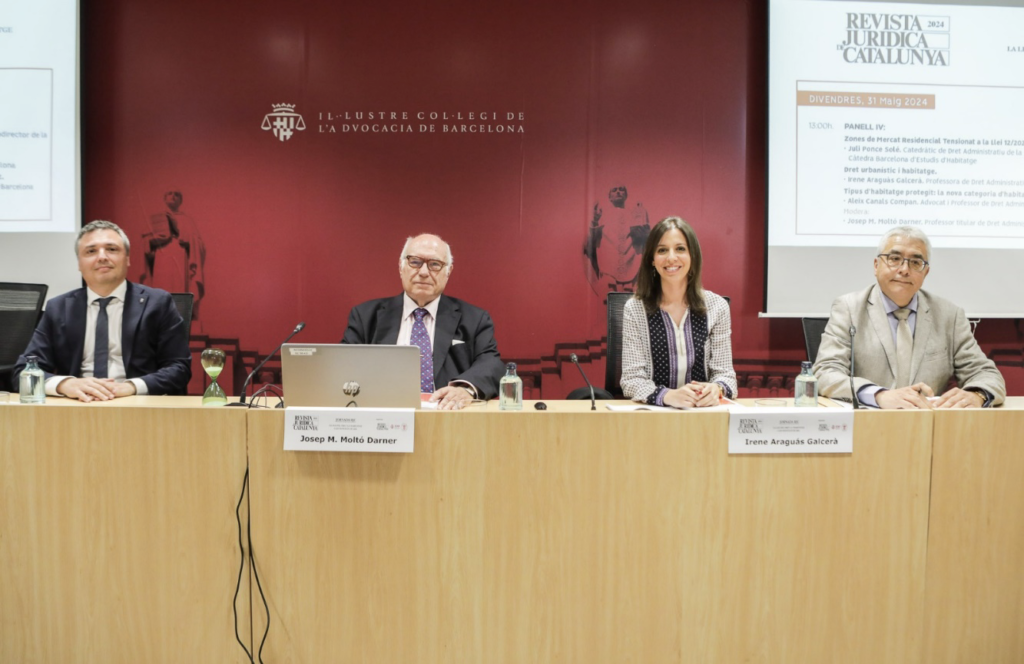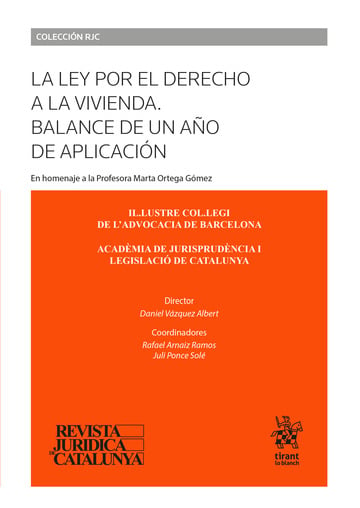NEWS
Publication on the Right to Housing Act

Tirant lo Blanch Publishing House has released a book, featuring contributions from several professors of the Barcelona Chair of Housing Studies (CBEH), which analyzes the State Law for the Right to Housing one year after its approval.
Within the framework of the “RJC 2024 Conference: The Law for the Right to Housing and the New Developments of 2024,” organized by the Revista Jurídica de Catalunya (RJC), the Barcelona Bar Association (ICAB), and the Academy of Jurisprudence and Legislation of Catalonia on May 31, 2024, the book La Ley por el Derecho a la vivienda. Balance de un año de aplicación (The Law for the Right to Housing: A One-Year Assessment) was presented. Published by Tirant lo Blanch, the book counts several CBEH members among its coordinators and authors.
The original idea to promote a conference and a publication addressing aspects from various legal branches came from two members of the Editorial Board of the Revista Jurídica de Catalunya (RJC), founded in 1895: Property Registrar and UB Associate Professor Fernando P. Méndez, and UB Professor of Administrative Law Josep Maria Moltó. Following their initial impetus, a first two-day conference on the topic was held in the autumn of 2023, which already featured professors from the CBEH, and from which this publication has now emerged. The work is dedicated to University of Barcelona Professor Dr. Marta Ortega, who also participated in that first conference and who sadly passed away a few months ago. The publication by Tirant lo Blanch appears within an RJC collection.
The Dean of ICAB, Jesús M. Sánchez; the President of the Academy of Jurisprudence and Legislation of Catalonia, Francesc Tusquets i Trias de Bes; and the Director of the Revista Jurídica de Catalunya, Eugeni Gay, inaugurated this second conference on May 31, 2024. The event featured the presentation of the aforementioned book and included the participation of several CBEH professors and the head of Tirant lo Blanch publishing house, Mr. Salvador Vives.

The objective of this Conference was to assess, from different legal perspectives (Civil, Procedural, Fiscal, Criminal, Administrative, etc.), the first year since the approval of the Law for the Right to Housing (Law 12/2023, of May 24) and to present the corresponding monograph.
The participating legal experts highlighted that this state housing law is the first national law passed in the democratic era with the aim of regulating the basic conditions to guarantee equality in the exercise of rights and the fulfillment of constitutional rights related to housing access. On May 21, the Constitutional Court deemed the law respectful of the constitutional framework, with the exception of a few less relevant articles, and considered Article 18—referring to the limitation of rental prices in Strained Residential Market Areas—to be in accordance with the Constitution. This new legislation distinguishes between two types of property owners: large holders and the rest. Large holders are individuals or legal entities that own more than 10 homes (in Barcelona, for example, 36% of the residential stock is in their hands, mostly legal entities engaged in economic activity) or five if the Autonomous Regions so decide in potential temporary declarations of Strained Residential Market Areas.
This new law also contains various types of measures affecting the behavior of both individuals, private companies, investment funds, and public administrations (with regulations pertaining to civil law, administrative law, tax law, urban planning law, etc.). One of the most controversial measures has been the establishment of limits on rent increases, in line with existing regulations in other countries; this legal regulation is to be evaluated in three years. As mentioned, the Constitutional Court, in its ruling on May 21, declared the law constitutional on this point, following the path taken by the Council of State and the German Constitutional Court with similar regulations in France and Germany, respectively.
The speakers warned that the difficulties in accessing property are particularly severe in Catalonia, which is the only Autonomous Community where the reference price index has been applied to update rents. In this context, it was highlighted that owners prefer to rent properties through temporary contracts or by renting out rooms in violation of the law to avoid complying with the limitations derived from the housing law. The participating experts concluded that the major problem of the rental housing market in Spain has, far from diminishing, increased after the new law, due both to fraud in the real estate market and the role of tourist and seasonal rentals and room rentals, which are not regulated by the law. These are essential issues that were unregulated until recently and have now begun to be addressed at the European level, with the approval of an EU Regulation a few weeks ago, and at the Catalan level, as explained by the experts during the conference.
The conference also addressed, from civil and procedural perspectives, the occupation of housing and the corresponding judicial criteria. Between 2008 and 2019, almost 700,000 evictions were carried out, affecting 2 million citizens. The speakers explained that difficulties in accessing housing have contributed to the spread of illegal occupation, which, in numerical terms, amounts to a few thousand—7,005 in 2022 in Catalonia, out of a housing stock of nearly 4 million units, with 95% of these occupations involving vacant homes, 80% owned by banking entities. It was highlighted that the eviction process has become more complex and lengthy, increasing from an average of 7 months to an average of two years since the law was passed. Therefore, some participating legal experts pointed out the need for legislation to include a precautionary measure to protect property rights in the face of illegal occupation, although representatives from the judiciary emphasized the problems this could pose in many cases where the property is vacant.
The conference also addressed that the difficulties in accessing housing would be very different if there were a social housing stock in line with European indices, which has not been the case due to an uncontrolled market and a lack of effective public policies for decades. Experts also noted that a historically flawed regulatory framework has allowed the majority of the nearly 6 million publicly subsidized homes built between 1962 and 2020 (almost 32% of the total residential stock) to be declassified and transferred to the free market at currently stratospheric prices, as explained in the preamble of the new State Law 12/2023 of May 24 for the right to housing.

This has resulted in Spain having one of the smallest social housing stocks in Europe, constituting less than 2% of the more than 18 million existing homes. Although the law provides for public-private collaboration mechanisms, such as land set-asides for publicly protected housing—which are also possible on consolidated urban land—reversing this situation now will require strong public intervention to compensate for the long-term neglect of the public interest in this area.

Continuing to neglect the generation of non-segregated, affordable housing by leaving it exclusively in the hands of for-profit private enterprise will mean perpetuating the housing emergency we currently face. This crisis is not new; it has been suffered for decades. Nearly two decades ago, the UN Special Rapporteur on housing already highlighted this issue. The designation of housing as a service of general interest by the state housing law, in accordance with EU regulations, should enable the development of more effective interventions in the real estate market. These interventions must be accompanied by adequate budgetary allocation, which is currently far below the European average.



